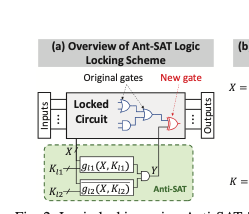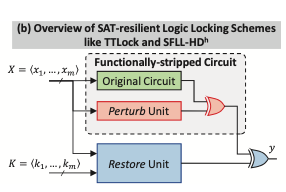GNNs for attacking
Now, all (at least from my knowledge) GNN-based works focus on attacking, that is, given a locked circuit, using GNNs to attack it (predict the correct key values).
These works can be roughly divided into two categories based on the target locking method.
GNNs for link prediction
To attack some logic locking methods, the problem can be formulated as a link prediction task. For example, for the MUX-based locking method, what the attacker is doing is actually trying to determine which edge in the MUX should be preserved.
Here are some papers (although most of them come from the same author)
ICCAD21 - UNTANGLE: Unlocking Routing and Logic Obfuscation Using Graph Neural Networks-based Link Prediction
DATE22 - MuxLink: Circumventing Learning-Resilient MUX-Locking Using Graph Neural Network-based Link Prediction
GNNs for node classification
- DATE21- GNNUnlock: Graph Neural Networks-based Oracle-less Unlocking Scheme for Provably Secure Logic Locking
- (Attack Anti-SAT) predict whether the node (gate) belongs to Anti-SAT (AN, green box) module or original design (DN, gray box)

- (TTLock and SFLL-HD) predict whether the node belongs to 1) orig design (DN) 2) pertub unit (PN) 3) restore unit (PN)
